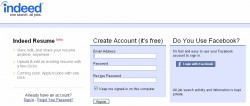 Indeed made it official this morning, decloaking its new resume service with a blog post encouraging job seekers to try it out.
Indeed made it official this morning, decloaking its new resume service with a blog post encouraging job seekers to try it out.
I posted about this a week ago, as word was leaking out that Indeed was conducting a private beta test. Indeed CEO Paul Forster confirmed the test, but didn’t offer many details then.
Now, what we see is a broadening job seeker service. Users create an account (if they don’t already have one) on Indeed where they can build a resume or upload one. The resume can be shared by making them public, or they can remain hidden and used only by the job seeker.
Public resumes are searchable on the site or via search engines. That makes Indeed resumes much more visible than the leading other public resume site, Craigslist. It’s also a significant improvement over Craigslist’s resumes, which can charitably only be described as free-form and clunky. Indeed’s resume builder creates the kind of resume any ATS can read.
Since the service is in beta and just launched, it’s going to be a while before Indeed has enough of a resume volume to be a significant recruiting source. But with more than 13 million unique monthly visitors and a promo on every page, Indeed’s resume potential is palpable.
 I’ve heard from a couple job board operators since the original post about this, and they’re wary of what the future holds. The two run small job boards, one of which has no resumes. Both upload their listings daily to Indeed and its competitor, SimplyHired, which send them a significant amount of traffic. Google, too, is a player, though not as strong.
I’ve heard from a couple job board operators since the original post about this, and they’re wary of what the future holds. The two run small job boards, one of which has no resumes. Both upload their listings daily to Indeed and its competitor, SimplyHired, which send them a significant amount of traffic. Google, too, is a player, though not as strong.
Both worry about the possibility of being disenfranchised by the search sites, a worry only fueled by the resume beta launch.
Last week I asked both Monster and CareerBuilder if the test altered their relationship with Indeed. (Job listings from both sites are indexed by the search sites.) And I asked if they regarded Indeed as a potential competitor.
Not surprisingly, I didn’t hear from either of them. I would be surprised, though, if they, too, weren’t wary of the evolution of the vertical search sites. Starting from zero six years ago, Indeed and SimplyHired are now No. 3 and 4 in total U.S. traffic.
At Monster and CareerBuilder, job posting fees are only a portion of their revenue. More than a third comes from resume searching. With the recession forcing all recruiters to become more creative and efficient in sourcing — a trend not likely to be reversed even in an improving economy — a free source of resumes will be a magnet, drawing in recruiters. If they find quality, and enough of a volume, it will become harder and harder to justify paying to search a database.
There’s no danger of that happening anytime soon. But, as a veteran of the newspaper industry’s disenfranchisement by the Internet, I see the parallels. SimplyHired and Indeed, besides free distribution of employer job posts, also offer pay-per-click premium positioning. That’s not something the major job boards have embraced. Yet it is something recruiters are testing, and, ironically, so are the job boards — but as customers of SimplyHired and Indeed!
When I emailed Indeed’s CEO about how his resume service might affect the relationship, Forster downplayed the effect.
“I’m not aware of any feedback from job boards on this,” Forster wrote me. “We have always seen job boards as partners and don’t see that changing for any reason.”
It’s a curious, and complex partnership, though. With both sites sending millions of job seekers to employer career sites and job boards, not posting to SimplyHired and Indeed is no option for most. Yet, that’s the very content that drives the traffic. Free public resumes ups the stakes.
Now add LinkedIn and its growing recruitment-based services and revenue to this mix, and it becomes evident that the recruitment advertising business is facing its own global climate change.